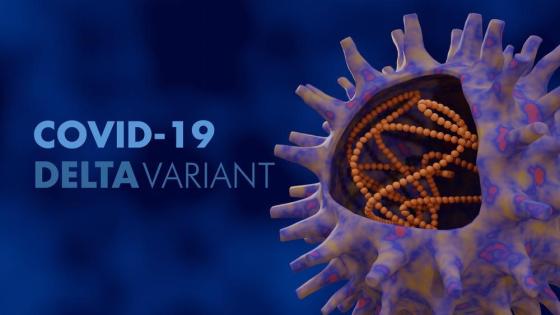Multi-Partner Liberia-US Collaboration Publishes Findings on the Presence of Covid-19 Delta Variant in Liberia During Surge in Reported Infections

In June 2021, Liberia experienced a surge of cases of infection with SARS-CoV-2, the virus that causes COVID-19. To investigate why, a team of scientists from Liberia and the United States conducted an in depth study of virus samples collected in the country. Not long after, on August 5, 2021, the Liberia Minister of Health announced that one of the dominant strains of SARS-CoV-2 circulating in the country had been identified as the delta variant. These important findings, based on the analysis of 146 virus samples, were made possible through an ongoing collaboration involving the Liberian Ministry of Health (MOH) and the National Public Health Institute of Liberia (NPHIL); Columbia University Mailman School of Public Health in New York, New York; and the Partnership for Research on Vaccines and Infectious Diseases in Liberia (PREVAIL), a clinical research partnership between the Liberian government and the U.S. National Institute of Allergy and Infectious Diseases. The partners describe their findings in an article that appears in the December 2021 issue of the scientific journal Emerging Infectious Diseases.
The successful collaboration addresses a critical need for scientific research and clinical data that can inform public health policies and response during the COVID-19 pandemic. The sequencing at Columbia University, determined that SARS-CoV-2 samples collected from patients hospitalized during March–July 2021 demonstrated that the Delta variant was in Liberia in early March and was dominant in June. Identifying the virus strains circulating in the Liberian population provides key information for implementing health regulations, appropriate clinical care, and safe and effective vaccines to prevent COVID-19.
Since it first emerged in 2019, SARS-CoV-2, the virus causing the COVID-19 pandemic, has been continually mutating—or undergoing small genetic changes—into slightly different forms known as variants. If the mutations help the virus survive, a variant can spread quickly to become dominant. This is the case with delta variant, which has quickly spread to become the main variant found in many countries around the world today. The WHO recently announced the emergence of a new variant named Omicron. The Omicron variant was classified as a new variant of concern on November 26 and is being monitored globally.
Bode Shobayo, Acting Deputy Director and a Research Scientist at NPHIL, who also collaborates with PREVAIL, traveled to the United States on behalf of Liberia with inactivated clinical samples that were analyzed for the new report. He led the gene sequencing efforts in close collaboration with scientists from the Columbia Mailman School’s Center for Infection and Immunity, including W. Ian Lipkin, MD, Director and John Snow Professor, and Nischay Mishra, PhD, Assistant Professor of Epidemiology. Dr. Lipkin’s team has been at the forefront of SARS-CoV-2 sequencing efforts during the global COVID-19 outbreak. CII’s initiative to develop coronavirus detection and treatment methods, the Global Alliance for Pandemic Prevention (GAPP), is supported by the Skoll Foundation.
The collaboration was initiated following a request for assistance by Liberia’s Incident Management System to PREVAIL. Recognizing the current limited capacity for gene sequencing in Liberia, the IMS requested assistance from trusted research partners who had experience with and a commitment to public health response efforts in Liberia. This initiative marks a successful demonstration of Liberia’s intent to continue building its capacity to detect, diagnose, and sequence the genes of viruses and other infectious agents that might pose a public health threat to Liberia and other countries. It also highlights the potential for the GAPP program to increase the global capacity for detecting and responding to emerging and re-emerging infectious diseases through training and partnerships with countries and “It’s important to identify the dominant strain in circulation in Liberia,” says Shobayo. “This knowledge will help us inform the population and implement the effective vaccine programs. I am grateful for the chance to partner with the Center for Infection and Immunity. I intend to pass along the skills I learned in New York to train my colleagues in Liberia to build scientific capacity.”
“It is a pleasure to work with Bode Shobayo,” says Dr. Mishra. "We are committed to assisting SARS CoV-2 surveillance and to developing tools in-country for pathogen discovery that will reduce the morbidity and mortality of infectious diseases in Liberia."
“When it comes to outbreaks, there is no such thing as ‘here’ and ‘there.’ Everything is everywhere. International air travel means a pathogen can spread from one part of the world to another in 24 hours or less,” says Dr. Lipkin. “Global scientific partnerships and capacity-building are critical to preventing the next pandemic well before it crosses the jet bridge. We are grateful to the National Institute of Health and the Skoll Foundation for making this partnership with Liberia possible.”
Liberia and CII, through PREVAIL, will continue to sequence SARS-CoV-2 samples, including those that may provide additional data on the newly classified Omicron variant and the efficacy of the COVID-19 vaccines being deployed in the country.
About the Center for Infection and Immunity
The Center for Infection and Immunity (CII) is one of the world's largest and most advanced academic centers focused on microbial surveillance, discovery, and diagnosis. The CII is directed by W. Ian Lipkin, MD, John Snow Professor of Epidemiology and Professor of Neurology and Pathology who has been named the “World’s Most Celebrated Virus Hunter” due to his speed and innovative methods of identifying new viruses. CII researchers have discovered more than 2,000 new microbes and contributed influential research on infectious and chronic diseases, including autism, Ebola, chronic fatigue syndrome/myalgic encephalomyelitis, tick-borne disease, Zika, and more.
